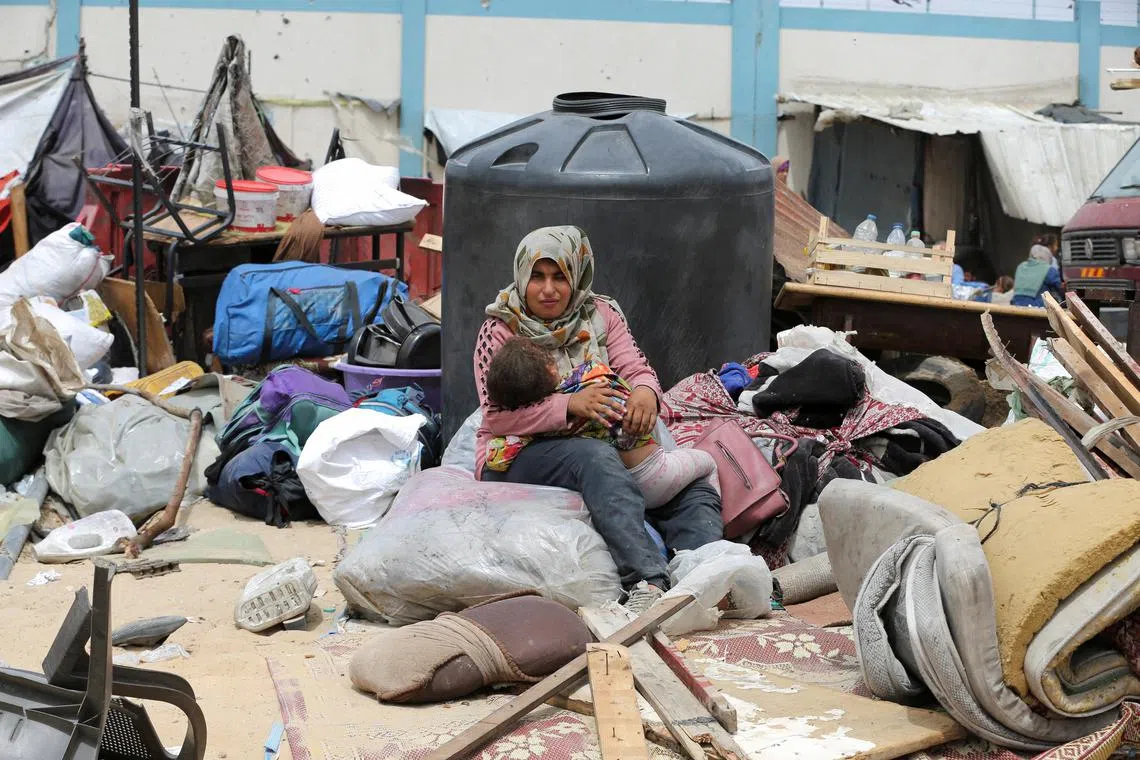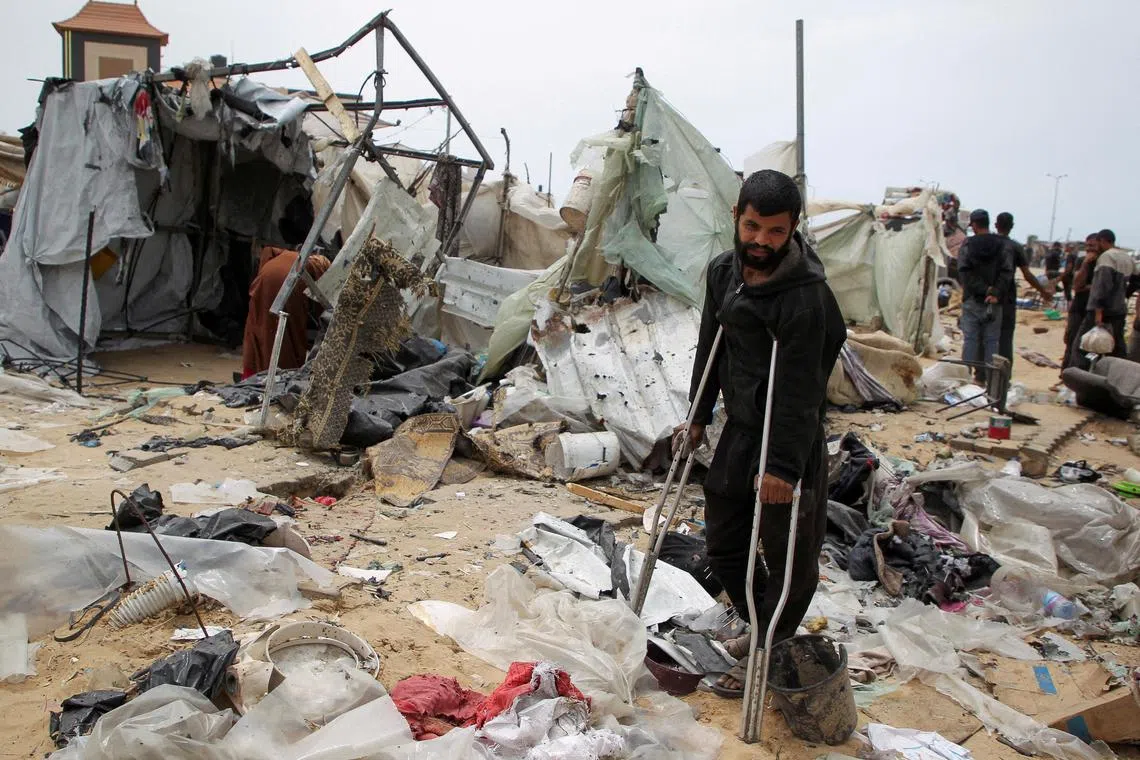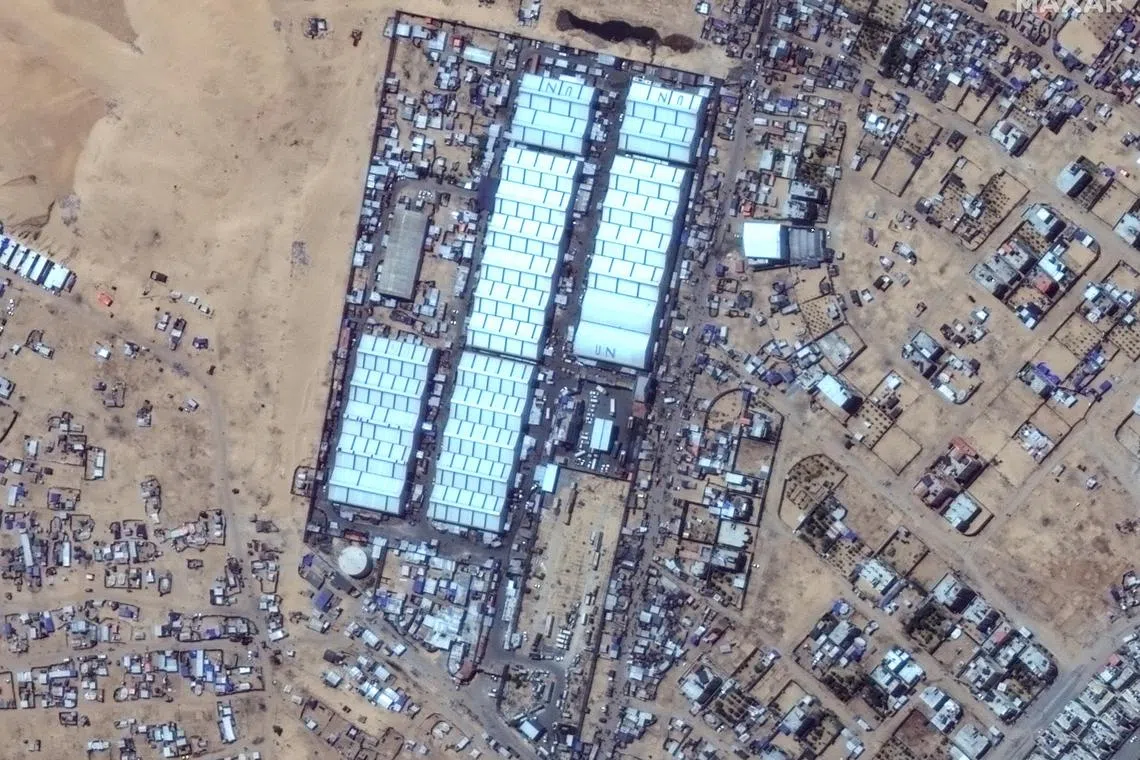Air strike kills 12 Palestinians as Israel presses on with raids into Rafah
Sign up now: Get ST's newsletters delivered to your inbox

A woman and a child amid Israel's military operation in Rafah, in the southern Gaza Strip, May 28.
PHOTO: REUTERS
CAIRO – Israeli forces killed at least 12 Palestinians in a dawn air strike on Rafah on May 30, as fighting raged in several other areas of the Gaza Strip.
Israel pressed on with its offensive on Rafah in southern Gaza a day after saying it had taken control of a buffer zone along the border between the enclave and Egypt, giving it effective authority over Gaza’s entire land border.
It said control of this zone has cut off a route used by Palestinian militant group Hamas to smuggle arms into Gaza during more than seven months of war.
Gaza’s health officials said the 12 Palestinians, all civilians, were killed as they were trying to recover a body in central Rafah.
Israel reported clashes in southern, central and northern Gaza, but did not immediately comment on the reported deaths in Rafah, where hundreds of thousands of displaced Palestinians took refuge earlier in the war.
Israel continued deadly raids on Rafah in southern Gaza despite an order from the International Court of Justice (ICJ) to end attacks on the city
The Israel Defence Forces (IDF) said on May 30 that it has so far killed around 300 militants during these raids.
In a televised briefing, Rear-Admiral Daniel Hagari, the military’s chief spokesman, said Israeli forces gained “operational” control over the “Philadelphi Corridor”, using the Israeli military’s code name for the 14km-long corridor along Gaza’s only border with Egypt.
“The Philadelphi Corridor served as an oxygen line for Hamas, which it regularly used to smuggle weapons into the area of the Gaza Strip,” he said.
Rear-Adm Hagari did not spell out what operational control referred to, but an Israeli military official earlier said there were Israeli “boots on the ground” along parts of the corridor.
The border with Egypt along the southern edge was Gaza’s only land border that Israel had not controlled directly.
On May 29, Israel sent tanks on raids into Rafah
The ICJ said Israel has not explained how it would keep evacuees from Rafah safe and provide food, water and medicine. Its ruling also called on Hamas to immediately and unconditionally release hostages taken from Israel on Oct 7
Rafah residents said that Israeli tanks pushed into Tel Al-Sultan in the west and Yibna and near Shaboura in the centre before retreating towards a buffer zone on the border with Egypt, rather than staying put as they have in other offensives.
Palestinian Authority Health Minister Majed Abu Ramadan urged Washington to pressure Israel to open the Rafah crossing to aid, saying there was no indication that the Israeli authorities would do so soon and that patients in besieged Gaza were dying due to lack of treatment.
Fighting in Gaza would continue throughout 2024 at least, Israeli National Security Adviser Tzachi Hanegbi said, signalling that Israel was not ready to end the war, as Hamas had demanded as part of a deal to exchange its hostages for Palestinian prisoners.
“The fighting in Rafah is not a pointless war,” Mr Hanegbi said, reiterating that Israel aimed to end Hamas rule in Gaza and stop it and its allies from attacking Israel.

A tent camp damaged in an Israeli strike in Rafah, in the southern Gaza Strip, on May 28.
PHOTO: REUTERS
In an overnight call with US Defence Secretary Lloyd Austin, Israeli Defence Minister Yoav Gallant underlined the continuing importance of Israeli operations in the Rafah area “due to concrete information regarding hostages held there”.
Mr Gallant said in a statement that he “detailed IDF activities in the Rafah area where 20 terror tunnels have been identified”.
The Israeli military also said tunnels used by Hamas for smuggling and moving fighters underground had been discovered during the latest raids, along with large amounts of arms and explosives.
It did not say where the smuggling tunnels ran from.
An Israeli official said on May 15 that there were 50 tunnels connecting Rafah to the Sinai in Egypt, and voiced concern that Hamas could use them to smuggle senior operatives or hostages into Egyptian territory.
Egypt on May 29 denied the existence of such tunnels.
The United States, Israel’s closest ally, on May 28 reiterated its opposition to a major ground offensive in Rafah, while saying it did not believe that such an operation was under way.
More than 36,000 Palestinians have been killed in Israel’s Gaza offensive, the enclave’s Health Ministry said.
Israel launched its war after Hamas-led militants attacked southern Israeli communities on Oct 7
Ceasefire negotiations struggle on
There was no word on May 29 on developments in the ceasefire and hostage release talks.
Hamas has said the talks are pointless unless Israel ends its offensive on Rafah.
The armed wings of Hamas and its ally Islamic Jihad said they confronted invading forces in Rafah with anti-tank rockets and mortar bombs, and blew up explosive devices they had planted, resulting in numerous successful hits.
The Israeli military said three Israeli soldiers were killed and three badly wounded. Public broadcaster Kan radio said an explosive device had been set off in a Rafah building.
As the war drags on, malnutrition has become widespread in Gaza as aid deliveries have slowed to a trickle, and the UN has warned of incipient famine.
Mr Philippe Lazzarini, head of the UN agency for Palestinian refugees (UNRWA), also called for an end to what he said were Israeli attacks on UNRWA staff and buildings in Gaza.
In an article for The New York Times, he said Israeli officials were “delegitimising UNRWA by effectively characterising it as a terrorist organisation”, and he described a “dangerous precedent of routine targeting of UN staff and premises”.
His comments followed allegations by Israel in January that 12 of UNRWA’s 13,000 staff in Gaza took part in the Oct 7 attack on Israel. Israel did not immediately respond to his remarks.

The UN camp in the Tel Al-Sultan area in the western district of Rafah on May 26.
PHOTO: REUTERS
The Gaza war has also stoked violence in the Israeli-occupied West Bank, another territory where Palestinians seek statehood.
Israel said two soldiers were killed in an overnight hit-and-run by a Palestinian motorist in the West Bank city of Nablus. There was no immediate claim of responsibility from Palestinian factions. REUTERS


